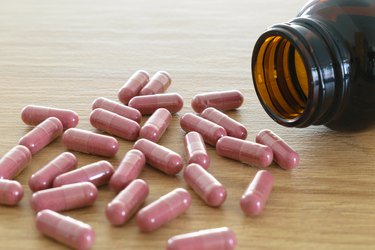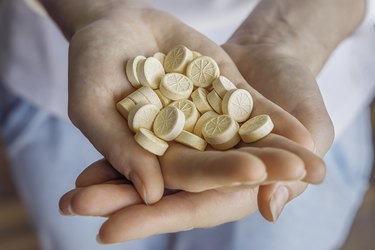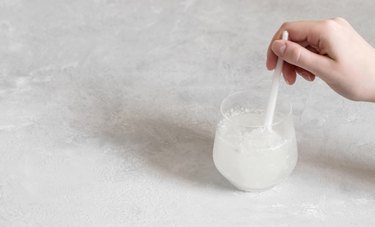
Whether you're prone to them or experiencing one for the first time, urinary tract infections (commonly referred to as UTIs) are uncomfortable and frustrating. If you suddenly start to notice telltale UTI symptoms — peeing more often, pain during urination, urgency — chances are you'll think of little else until you feel some relief.
Antibiotics are the first-line treatment for urinary tract infections, and it's important to check in with a doctor rather than attempt to self-treat. Your practitioner can take a urine sample to confirm the symptoms you're experiencing are in fact a UTI and recommend the best course of treatment.
Video of the Day
Video of the Day
But it's not always easy to get a prescription quickly when symptoms start developing, and you may be looking for natural remedies to support your recovery in the meantime, as well as things you can do at home to avoid future infections.
Read on for everything you need to know about home remedies for UTI relief and UTI prevention methods.
First: You Should Always See a Doctor About UTI Symptoms
If they go untreated, UTIs can spread to the kidneys, per the Mayo Clinic, which can lead to serious health problems. That's why it's so important to see a doctor ASAP about your symptoms, so they can prescribe the appropriate treatment and get you on the road to recovery.
If you're awaiting an appointment with your doctor, there's no harm in trying one of the remedies below in case they help minimize your symptoms — just make sure your practitioner has given you the green light that they're safe to take with any medications you're on.
But experts stress that home remedies or supplements are not reliable treatments for urinary tract infections. To completely treat a UTI, "you will need a round of antibiotics geared specifically to the type of bacteria you are infected with," says Koushik Shaw, MD, a urologist at the Austin Urology Institute in Austin, Texas.
Alternative, over-the-counter UTI treatments such as probiotics, cranberry juice and D-mannose are frequently used, and it's certainly possible they'll improve symptoms somewhat.
"But none have shown any good success in randomized, controlled trials to be used as a standalone agent," says Charles Ascher-Walsh, MD, Senior System Vice-Chair for Gynecology and Division Director for Urogynecology in the Raquel and Jaime Gilinski Department of Obstetrics, Gynecology and Reproductive Science at Mount Sinai in New York City.
What's more, there are a number of reasons why it's critical to consult a doctor and get a urine culture if you're experiencing UTI symptoms:
- It might not be a UTI you're dealing with. Other illnesses can cause symptoms that are similar to those of a UTI, and you won't know exactly what's going on without a urine culture. "There are conditions that a lot of women suffer with and are misdiagnosed for years before they're appropriately treated for them," says Dr. Ascher-Walsh. That can include interstitial cystitis, also known as painful bladder syndrome, as well as some sexually transmitted diseases. "Treating" repeat UTIs with home remedies won't get to the root of the problem.
- A urine culture is the best way to ensure you're not taking unnecessary rounds of antibiotics. That's especially true if you're having recurrent UTIs. Because urinary tract infections are so prevalent, practitioners often prescribe antibiotics over the phone to patients with seemingly obvious symptoms. That might be fine if you're just getting one UTI a year, says Dr. Ascher-Walsh, but with recurrent UTIs, this approach can increase the risk of antibiotic resistance. By taking a urine culture, your doctor can make sure they're treating your infection with antibiotics specific to that type of bacteria. "This way we do not add to antibiotic resistance and you are not taking unnecessary rounds of antibiotics," says Dr. Shaw.
- Waiting too long to start antibiotics can enable an infection to get worse. Sometimes your immune system will manage to fight off a UTI on its own, but it's still preferable to consult your doctor rather than crossing your fingers and waiting for that to happen, especially because certain bacteria can worsen if left untreated. "UTIs themselves are not a big deal, but a kidney infection is a much more significant problem that can sometimes be life-threatening," says Dr. Ascher-Walsh. "You don't want to play around with alternatives since we have treatments that prevent [the infection] from ascending up to your kidneys."
The bottom line is that antibiotics are the surest course of action to treat a UTI. However, "if it doesn't delay your care, natural remedies will not hurt you," says Dr. Shaw.
If you're interested in trying home remedies for a urine infection while waiting for your urine culture to develop or prescription to arrive, or you're searching for ways to prevent recurring UTIs, here are a few that may offer benefits.
1. Drink More Water

Drinking enough water is essential for maintaining overall urinary tract health and preventing UTIs. That's because dehydration can up your risk for developing a urinary tract infection in the first place, and drinking plenty of fluids helps dilute your urine and prevent "bad" bacteria from taking hold in the urinary tract, per the Mayo Clinic.
But while water can help "flush" bacteria from the urinary tract and prevent an infection from developing, drinking more isn't enough to treat a urinary tract infection on its own, experts say. "It's unlikely that drinking water alone can completely flush out an active UTI," says Dr. Shaw. "You will more than likely need antibiotics to fully eliminate the infection."
If you do have a UTI, it's still critical to stay hydrated even though doing so probably won't get rid of bad bacteria entirely: Drinking enough lets you urinate frequently, which in turn can help alleviate some of the more uncomfortable UTI symptoms, such as burning and pain during urination.
It's also possible for dehydration to present with similar symptoms to a UTI, says Dr. Ascher-Walsh. If you haven't been drinking enough water and suddenly start to develop UTI-like symptoms, the first thing you should do is up your H2O intake. "Make sure you're drinking enough," he says. "If the symptoms persist, it's not just dehydration."
2. Try Cranberry Juice or Supplements

When it comes to so-called natural remedies for UTIs, most have little research to support their use as either a preventive measure or treatment. But one that is promising is cranberry: "The only thing that has really good evidence is cranberry extract," says Dr. Ascher-Walsh.
He points out that the American Urological Association (AUA) added cranberry juice and tablets to their recommendations on recurrent UTI treatment for people assigned female at birth a few years ago. In those guidelines, the AUA said clinicians may suggest products that contain a certain type of cranberry extract with proanthocyanidins (PACs) to patients with recurrent UTIs.
"Studies have shown that this particular extract inhibits the bacteria from clinging to the walls of the bladder, and so it can lessen the chances of someone getting a UTI who has recurring UTIs," explains Dr. Ascher-Walsh.
PACs are found in varying concentrations in cranberry juice or supplements depending on the formulation used, but not all supplements on the market contain enough to be effective. You should reach out to your practitioner for a recommendation on which product to take.
Keep in mind that the American College of Obstetricians and Gynecologists recommends unsweetened cranberry juice only, but notes it's not clear exactly how much juice is needed to prevent an infection.
Bottom line? Most of the research done supports cranberry juice or supplements with high levels of PACs for the prevention — not treatment — of UTIs, but more research needs to be done.
3. Get Some Probiotics

Probiotics — living microorganisms that naturally exist in the GI tract — have been linked to numerous health benefits, from improved digestion to better immune response. And some research, such as one September 2018 study in the Turkish Journal of Urology, suggest probiotics such as Lactobacillus acidophilus may support overall urological health and reduce the risk of UTIs.
However, in the AUA's guidelines for treating recurrent UTIs, the expert panel noted that while probiotics are often referenced as a non-antibiotic treatment for urinary tract infections, there's currently insufficient data to recommend them as a preventive measure or treatment.
So while there's probably no harm in taking probiotic supplements if you have a UTI — and they may provide other benefits, such as for your digestive health — you shouldn't rely on them alone for treatment.
People with weakened immune systems should also consult a doctor before taking probiotics.
4. Consider Vitamin C Supplements

Some early research suggests that vitamin C, also known as L-ascorbic acid, may offer benefits for urinary health. In a small June 2016 study in European Urology, vitamin C was found to be a potentially safe and effective way to help manage recurrent UTIs when combined with cranberries and a Lactobacillus rhamnosus probiotic.
And although very small, an October 2020 study in the African Journal of Urology of kidney transplant patients who were given high-dose intravenous vitamin C noted significantly lower rates of bacteria in the urine of the vitamin C group versus those given a placebo.
The theory is that vitamin C "may help acidify the urine to make an inhospitable environment for the bacteria to run rampant," explains Dr. Shaw.
But these studies were small and limited, and more research on the connection between vitamin C and urinary health is needed.
Dr. Shaw says there's no harm in taking a vitamin C supplement or increasing your intake of vitamin C-rich foods such as red bell pepper, kiwi, broccoli and strawberries.
But as with the other supplements listed here, vitamin C alone won't treat a UTI. The vitamin can also interact with certain types of medications, so consult your doctor before taking a new supplement.
5. Try D-Mannose Supplements

Although it hasn't been as well-studied as cranberry juice, there's some evidence to suggest that D-mannose, a type of sugar, can prevent certain bacteria from growing in the urinary tract.
In an August 2020 systematic review on D-mannose for UTI prevention in the American Journal of Obstetrics & Gynecology, researchers found that the supplement was well-tolerated and possibly protective for recurrent urinary tract infections.
Dr. Shaw says he sometimes recommends D-mannose capsules to patients in his practice, and they might be worth trying if you're prone to UTIs. As with the other supplements on this list, though, more research on them is needed.
"A lot of people use D-mannose, but the studies aren't as good as those for cranberry, so the AUA didn't adopt it as a preventative treatment," says Dr. Ascher-Walsh.
What About Garlic Extract Supplements?
The consumption of garlic and its extracts have been linked to disease-preventing effects on cancer, cardiovascular disorders, diabetes and numerous other conditions.
Some experts think garlic extract supplements may also help prevent UTIs because garlic has antimicrobial properties, explains Dr. Shaw. But little research has been done on the connection between garlic and urinary health, so it's best to skip this remedy.
What About Apple Cider Vinegar?
Apple cider vinegar is often touted as a natural remedy for a wide range of health issues. But there's no evidence to suggest it's effective in either treating or preventing UTIs, says Dr. Shaw.
In fact, ACV may do more harm than good: "The strong acidic properties of apple cider vinegar may also irritate the bladder and urinary tract, exacerbating UTI symptoms," he says.
FAQ
1. What Is the Fastest Way to Cure a UTI Naturally?
Unfortunately, there are no "natural" treatments for a urinary tract infection. You might find that the home remedies above help minimize your symptoms while you wait for an appointment with your doctor, but none have been scientifically proven to actually treat a UTI. "Studies are inconclusive that these [supplements] make a difference," says Dr. Ascher-Walsh.
"You can minimize your symptoms by increasing water intake or by taking certain supplements, but to completely treat [a UTI] you will either need to rely on your own immune system" — a strategy that can leave you vulnerable to a worsening infection — "or [get] a round of antibiotics geared specifically to the type of bacteria you are infected with," says Dr. Shaw.
2. What Foods Should You Eat or Avoid With a UTI?
Changes to your diet won't treat an active UTI, nor can diet cause one to develop. But certain foods might be more irritating on your bladder, which could exacerbate existing UTI symptoms.
If you have a UTI, you may feel more comfortable avoiding these bladder-irritating drinks and foods, per Mount Sinai and the Mayo Clinic:
- Coffee
- Carbonated drinks, even if they're caffeine-free
- Alcohol
- Acidic fruits, like lemons, limes and oranges
- Fruit juices
- Chocolate
- Tomato-based foods
- Spicy foods
To promote general urinary and bladder health, fill up on these foods:
- High-fiber foods such as whole grains and legumes
- Antioxidant-rich foods such as blueberries
- Healthy cooking oils such as olive oil
- Probiotic-rich foods such as yogurt, kefir and sauerkraut
3. Can I Take a Bath if I Have a UTI?
Showers are your best bet if you have a UTI. "Sitting in a bath for an extended period can cause moisture to build up in the genital area, creating an environment that is more hospitable to bacterial growth," says Dr. Shaw.
If you do take a bath, make sure the water is clean and avoid using any products that could irritate the urinary tract, such as scented soap, bubble baths or bath salts.
4. Can You Try Natural UTI Remedies if You’re Pregnant?
Treating a UTI quickly with a course of antibiotics is particularly important if you're pregnant. That's because a urinary tract infection during pregnancy can result in more serious complications for you and your baby.
A UTI can up your risk of delivering prematurely or having a baby with a low birth weight, for one. During pregnancy, urine may be more likely to flow backwards up from the bladder to the kidneys, explains Dr. Ascher-Walsh. "So if you have an infection, there's an increased risk of developing infection of your kidneys," which can be more difficult to treat, he says.
Plus, you should be mindful about taking any supplements during pregnancy, because they could contain ingredients that are potentially unsafe for your developing baby.
For example, pregnant and breastfeeding people should avoid taking concentrated cranberry supplements. "They may increase the risk of bleeding or interact with certain medications," says Dr. Shaw.
The bottom line: Symptoms of a urinary tract infection should always be taken seriously, but especially if you're pregnant. Tell your ob-gyn right away and request a urine culture so you can be treated properly.
- American Urological Association: "Recurrent Uncomplicated Urinary Tract Infections in Women: AUA/CUA/SUFU Guideline"
- African Journal of Urology: "Deep Insights Into Urinary Tract Infections and Effective Natural Remedies"
- Antioxidants: "Potential Health Benefit of Garlic Based on Human Intervention Studies: A Brief Overview"
- Centers for Disease Control and Prevention: "Urinary Tract Infection"
- Cleveland Clinic: "Urinary Tract Infections"
- John Hopkins Medicine: "Urinary Tract Infections"
- Mayo Clinic: "Urinary Tract Infections"
- Mayo Clinic: "Interstitial Cystitis"
- Mayo Clinic: "Bladder Control: Lifestyle Strategies Ease Problems"
- Mayo Clinic: "Can Drinking More Water Help Women Fight Urinary Tract Infections?"
- Mount Sinai: "Urinary Tract Infection in Women"
- National Institutes of Health, Office of Dietary Supplements: "Vitamin C"
- StatPearls: "Urinary Tract Infection In Pregnancy"
- Turkish Journal of Urology: "The Role of Probiotics in Women With Recurrent Urinary Tract Infections"
- U.S. Department of Health & Human Services, Office on Women’s Health: "Urinary Tract Infections"
Is this an emergency? If you are experiencing serious medical symptoms, please see the National Library of Medicine’s list of signs you need emergency medical attention or call 911.